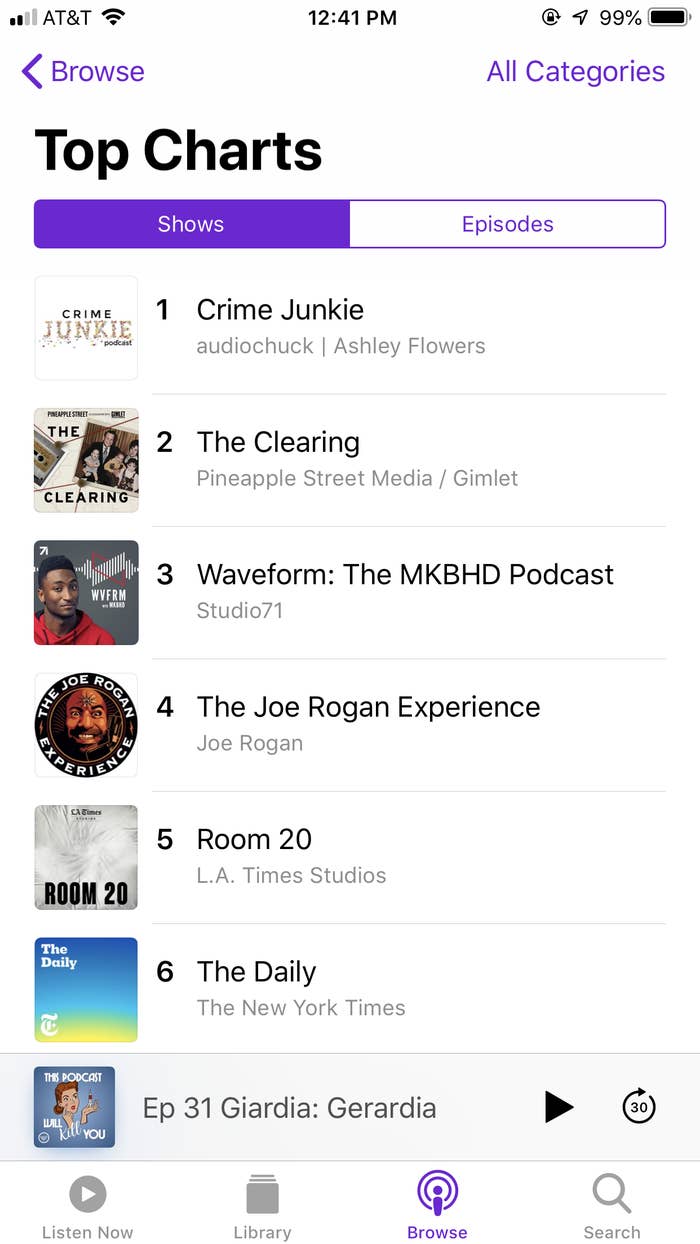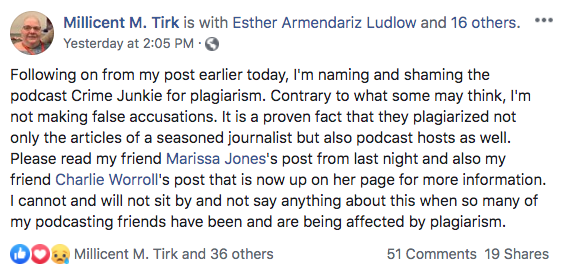The hosts of the popular true crime podcast Crime Junkie have been accused by a former journalist and multiple fellow podcasters of using their work in episodes without credit — and then quietly deleting the episodes after being called out.
Crime Junkie is a weekly podcast hosted by Ashley Flowers of Indianapolis and her childhood friend, Brit Prawat. Flowers, a self-proclaimed "crime junkie" herself, launched the podcast in December 2017 after working with her local Crime Stoppers. Flowers told Deadline she hosted a crime segment on a local radio station before starting the podcast.
Over the past year, Crime Junkie has rapidly become one of the most popular podcasts of the genre and is currently the most listened to series on the iTunes podcast charts. The show has a five-star rating on iTunes and more than 100,000 reviews.
Flowers and Prawat have quickly leveraged their success, selling merchandise and hosting a series of live shows around the country this summer and fall. They also have a fan club on Patreon, where fans can pay for extra content. (Full disclosure: I interviewed Flowers on the BuzzFeed News Twitter show AM to DM earlier this year and subscribed to her Patreon for a time.)

This week, however, the hosts have come under scrutiny after a journalist and other podcasters accused the duo of not properly crediting sources. Many episodes, including some of the ones in question, have since vanished from the show's podcast archive without explanation.
The hosts did not return a request for comment from BuzzFeed News. However, they posted a statement on Facebook on Thursday saying they had pulled the episodes because "their source material could no longer be found or properly cited."
"There is no greater priority for our team, or for me personally, than to ensure the highest levels of accuracy and integrity in our program," the statement read. "Our research process is thorough, rigid, and exhaustive, and those familiar with 'Crime Junkie' are aware that we make clear references to the use of other sources and that comprehensive notes and links to all sources are made available on our show's website."
The most prominent allegation came from Cathy Frye, a former journalist who worked for 15 years at the Arkansas Democrat-Gazette newspaper. On Monday, Frye commented on a post on Flowers' personal, but public, Facebook page, saying that she believed Crime Junkie used information from a series of articles she wrote as a source for an episode, but never credited her. Soon after, the episode was deleted without explanation.
The episode in question discussed the 2002 murder of a 13-year-old girl from Arkansas named Kacie Woody. In 2003, Frye wrote a four-part series on the case for the Arkansas Democrat-Gazette called "Caught in the Web."
Frye told BuzzFeed News she first learned of the podcast while traveling with her 16-year-old daughter. They listened to a few episodes, and her daughter noticed the episode on Woody's case. But Frye said she became angry when she heard several details in the episode that she had exclusively reported on in her series.
The hosts of Crime Junkie never cited a source for the information in the episode, Frye said. Instead, Flowers referred to unspecified "research."
“They could not have done the podcast they did and the story they did without my story right in front of them," she said.
Frye spent months reporting on the case, winning the trust of Woody's father, closest friends, and police. She said the project "sucked a big part of my soul," and she is still interviewed as an expert on the case for true crime media outlets. When Frye realized her work was being disseminated by the podcast without credit, she was "horrified."
“I was appalled they would take somebody's work in such detail," she said.
Frye, who described herself as a fan of podcasts, said she has no problem being used as a source, but believes podcasters need to give credit where it's due.
“If you're going to use very specific, detailed information from a primary source, you should credit it," Frye said.
Crime Junkie usually cites their sources for each podcast episode on a webpage. Since the episode featuring Woody has been deleted as well as the episode webpage, it's unclear if Frye's article was ever credited. A cached version of the site did not show any sources.
Another podcast fan, Millicent Tirk, wrote Tuesday on Facebook that she was "naming and shaming the podcast Crime Junkie for plagiarism," after the hosts used information from other podcasts without proper credit.

After speaking with Tirk, BuzzFeed News was contacted by a handful of podcasters who said they recognized their own work in episodes of Crime Junkie, but were not credited. Some would only speak off the record over fears of backlash from the show's large fanbase, but two were willing to detail their accusations to BuzzFeed News.
Robin Warder, who has hosted The Trail Went Cold podcast for three and a half years, also promotes his program by summarizing many of the episodes on the Unresolved Mysteries subreddit, where he lists all of his sources. Last year, Warder posted about his episode on the case of the 2015 death of Henry McCabe. Warder said he believes the hosts of Crime Junkie later used it as their source for a May 2018 podcast without credit. Warder specifically cited a passage at 19:25 of Crime Junkie Episode 25, in which he claims Flowers is "practically reading verbatim" from his Reddit post.
In the episode, Flowers said she learned of the case "maybe in one other podcast episode," one "Reddit thread," and a "couple of news articles," but didn't specify the the sources. On the show's website, Flowers cited the same four news articles that Warder had sourced for his episode.
Warder said the issue of podcast hosts not properly citing their sources is prevalent in the industry.
"There are sometimes issues in the true crime podcasting world with shows not citing their sources, and some podcasts don’t do any research besides reading off Wikipedia," he said, "but Crime Junkie is probably the most high-profile example of this."
Esther Ludlow, who has hosted the Once Upon a Crime podcast for three years, said she personally researches and produces her podcast, and cites sources in her episode notes. Ludlow said she cites sources of direct quotes when she uses them in her episodes.
In April 2018, Ludlow released an episode on a series of missing and murdered women in Ciudad Juárez, Mexico. In June 2018, she said she noticed Crime Junkie also covered the case.
"I took a listen to see how she had presented it," Ludlow said. "After just a few minutes it sounded very familiar."
Ludlow said she pulled out her transcript of her episode, and found several instances she believes were "either verbatim, or almost verbatim" from her own episode. She said the episode was also presented in a similar format.
"Some ideas and theories I put together from several sources were presented on Crime Junkie’s episode as if they were Ashley’s own ideas," she said.
BuzzFeed News could not confirm Ludlow's allegations because the episode has been deleted from Crime Junkie's episode list and website. A cached page for the episode showed no sources.
Ludlow said she never spoke to Flowers or Prawat about the issue, and has no idea why the episode was deleted.
After Frye and Tirk's Facebook posts, accusations and rumors soon spread across the internet to forums like the podcast's subreddit. Many fans expressed disappointment with the allegations, and said they had noticed a few other episodes had been deleted, such as Episode 73, the case of Kirsten Hatfield, Episode 45, the case of Angela Savage, and Episode 27, the case of Misty Copsey.
Posts about the Hatfield and Savage episodes are still live on their Instagram page, however.
Some fans of the podcast said on Reddit they were confused about when, in the opaque and unregulated world of podcasts, unspecified "research" becomes plagiarism.
"I [feel] like this is a very grey area...as long as CJ cite the reference I don't see why she can't use it," wrote one person.
"If she is in fact proven to be reading someone else’s story verbatim I will agree that it’s wrong," wrote another. "If she’s repeating facts verbatim as a part of the story, that doesn’t really seem wrong to me. Maybe I have a low moral compass lol but a written article and an episode of Crime Junkie are usually very different."
Many fans agreed, however, that podcasters need to clearly cite their sources.
"Being that it seems they weren’t giving credit/citing properly, it’s definitely a case for plagiarism," said one.
In their Facebook statement, the hosts wrote their podcast "would not be possible absent the incredible efforts of countless individuals who investigate and report these stories originally, and they deserve to be credited as such."
"We are committed to working within the burgeoning podcast industry to develop and evolve its standards on these kinds of issues," they said.
Frye, the former journalist, said that in the era of fake news and explosion of media outlets online, citing sources is extremely important.
“Now more than ever, I think it's important to disclose where you got your information, and people can judge for themselves the credibility," she said. “I just ask that they offer credit where credit is due and be transparent where they are getting their information."
Ludlow said she finds the situation "infuriating" because it threatens to give podcasters a bad reputation.
"I wish people knew how much time and energy it takes into making a successful show," she said. "Something like this gives people the false impression that podcasters, and especially true crime podcasters, just read a Wikipedia article or other source and copy it verbatim."
